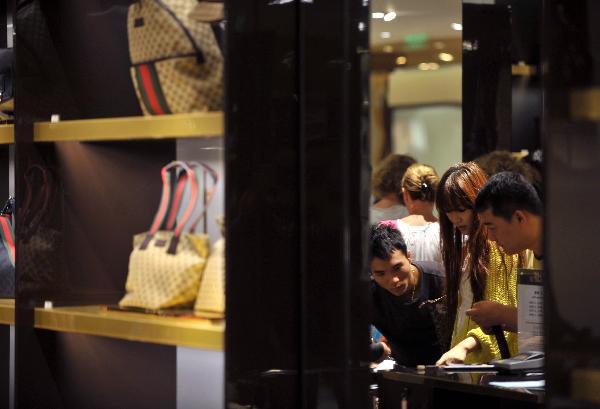 |
| Photo taken on March 23, 2011 shows customers choosing suitcases in a duty-free shop in Sanya, south China's Hainan Province. China's Ministry of Finance (MOF) announced Thursday that Hainan will implement a tax rebate program for tourists on a trial basis from April 20. The program targeted tourists 18 years old and above from home and abroad who would like to fly off the island to other places of China and set the rebate cap on commodities with a total value of no more than 5,000 yuan (762 U.S. dollars) per person each time. |
China's Ministry of Finance (MOF) announced March 24 that Hainan, a tropical island province in southern China, will implement a tax rebate program for tourists on a trial basis starting April 20.
The program sets the rebate cap on commodities with a total value of no more than 5,000 yuan (762 U.S. dollars) per person each time and is aimed at tourists 18 years old and older from both home and abroad who will fly to other destinations in China from the island.
Each eligible tourist can claim rebates twice a year, while island residents can claim rebates once a year.
The refunded taxes include customs duties, importation value added taxes and excise taxes, said a statement posted on the MOF website.
Tourists can also buy one item worth over 5,000 yuan per person each time provided they pay the commodity's import duty, according to the statement.
This program covers 18 types of imported goods including jewelry, artwork, wristwatches, perfumes, cosmetics, pens, glasses, scarves, neckties, wool fabrics, cotton goods, clothing, belts, bags, small leather goods, candies and sporting goods.
The program was modeled on tax rebate programs practised by the Jeju island, the Republic of Korea, and Okinawa, Japan, but Hainan's scheme offers greater rebates, said MOF officials.
The tax rebate program was compiled jointly by the MOF, Ministry of Commerce, General Administration of Customs, State Administration of Taxation and relevant departments in Hainan Province.
The unveiling of the program came after China inaugurated a tax refund program to attract foreign tourists on January 1 this year. This program made foreign tourists as well as citizens from Hong Kong, Macao and Taiwan who have lived in China's mainland for no more than 183 consecutive days eligible for an 11 percent tax rebate on certain purchases.
Under this program, tax refunds could be received for purchases of 324 items across 21 categories, such as clothing, cosmetics, watches and jewelry. Commodities of wide consumption, like food, beverages, tobacco and alcohol, are not eligible for tax refunds.
In January last year, the State Council, or China's Cabinet, unveiled guidelines aimed at building Hainan into a top international tourism destination by 2020.
The tax rebate policy has been one of the most talked about policies concerning the island's tourism development.
Hainan was designated as a province in 1988 and became China's largest special economic zone in the same year. The island province enjoys preferential development policies and boasts year-round tropical weather, clean beaches, forests and diverse ethnic cultures.
Hainan hosted nearly 26 million overnight tourists in 2010, 97 percent of whom were domestic tourists, said Wang Keqiang, deputy director of Hainan's provincial commerce bureau.
"Domestic tourists have great purchasing power. Some customers have already come to me to ask about the new tax policy and ask about possible price changes," said Wang Mei, a cosmetics salesperson in a duty-free department store in the city of Sanya.
In 2010, Chinese consumers bought a total of 188 billion yuan in products from overseas markets, while one third of the buyers of luxury goods in the United Kingdom were from China. This shows that a large number of Chinese people's consumption happened overseas, Wang said.
"Once the new tax rebate policy takes effect, domestic consumers can buy products in Hainan instead of going abroad. The consumption potential is tremendous," Wang added.
The tax rebate program will inject the island's tourism industry with vitality, said Wang Yongjun, dean of the finance and economics college of Central University of Finance and Economics.
"The policies try to create a tax-free shopping paradise similar to Hong Kong in Hainan to boost China's tourism," Wang said.
"But whether the policies can benefit Hainan's tourism in a long term or not, will be largely depended on other supporting facilities and the integrated environment of Hainan island," Wang added.





